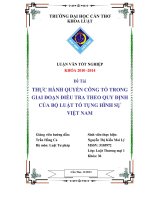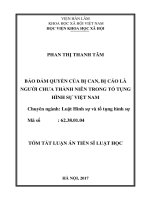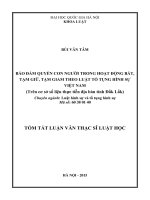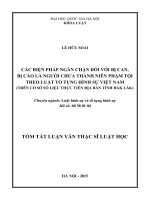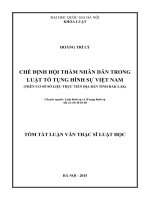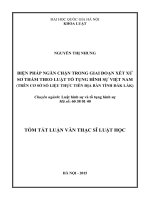Thực hành quyền công tố trong điều tra các tội giết người theo pháp luật tố tụng hình sự việt nam tt tiếng anh
Bạn đang xem bản rút gọn của tài liệu. Xem và tải ngay bản đầy đủ của tài liệu tại đây (292.32 KB, 33 trang )
VIETNAM ACADEMY OF SOCIAL SCIENCES
GRADUATE ACADEMY OF SOCIAL SCIENCES
L
NGUYEN QUOC HAN
EXERCISING THE RIGHT TO PUBLIC
PROSECUTION IN INVESTIGATING MURDER
UNDER THE VIETNAMESE CRIMINAL
PROCEDURE LAW
Major: Criminal Law and Criminal
Proceedings
Major code: 9.38.01.04
SUMMARY OF THE DOCTORAL DISSERTATION IN LAW
Hanoi - 2019
The dissertation completed at Graduate Academy of Social Sciences,
Vietnam Academy of Social Sciences
Supervisor: Assoc. Prof. Dr. Nguyen Van Huyen
Reviewer 1: Prof. Dr. Bui Minh Thanh
Reviewer 2: Assoc. Prof. Dr. Tran Van Do
Reviewer 3: Assoc. Prof. Dr. Đo Thị Phương
The dissertation will be defended at Graduate Academy Level Council of
dissertation assessment at Graduate Academy of Social Sciences, Vietnam
Academy of Social Sciences, 477 Nguyen Trai, Thanh Xuan, Hanoi.
Time: ………… date ………. month …… …year 2019
The dissertation may be found at:
- Vietnam National Library;
- Graduate Academy of Social Sciences Library
INTRODUCTION
1. The necessity of the research topic
Exercising the right to public prosecution is one of the two important
functions of the People’s Procuracy stipulated by Article 107 of the
2013 Consitituion and Article 3 of the 2014 Law on organization of the
People’s Procuracy. Implementing the renovation policy of the 9th, 10th,
11th, and 12th National Party Congress of the Communist Party of
Vietnam (CPV) and implementing the objectives of judicial reform set
out in Resolution No. 49-NQ/TW dated 02 June 2005, considering
organizational reform and trial activities as the concentrated mission. In
which, the objectives of reforming the Procuracy sector, that is “In the
short term, the People’s Procuracy will retain its current function of
exercising the right to public prosecution and supervising judicial
activities. The People's Procuracy is organized in accordance with the
court’s organizational system, strengthening public prosecutor’s
responsibility in investigating”. In recent years, there have been
increasing the number of murders with serious nature and sophisticated
tricks. Before such development, the People’s Procuracy sector has
made great efforts to improve its responsibility in exercising the right to
public prosecution for criminal cases in general, murder cases in
particular, ensuring handling right person, right crime and right law.
However, because there are still a number of officials, procurators who
are limited in their knowledge and awareness on exercising the right to
public prosecution in investigating murder, especially awareness on
their positions, roles and responsibilities in exercising the right to public
prosecution in investigating murder, this leads to low efficiency and
revealing many limitations and weaknesses. From different legal
awareness, there is no uniform on how to understand and apply the law
1
in the process of solving cases, leading to the application of criminal
laws of the procedural bodies at each time and place is different in
finding out what is the boundary between “murder” and crime of
“killing someone else in an intense agitated state”, “killing someone
else due to exceed the limits of legitimate self-defense or exceed the
necessity when arresting offenders”. So as to apply the law correctly.
From this fact, it is necessary to examine and clarify the theoretical and
practical issues on exercising the right to public prosecution in
investigating murder. For such reason, the author has been conducting
research work titled “Exercising the right to public prosecution in
investigating murder under the Vietnamese criminal procedure law” as
his doctoral dissertation in law.
2. Research purpose and tasks
2.1. Research purpose
The study aims to clarify the theoretical and practical issues on
exercising the right to public prosecution in investigating murder under
the Vietnamese criminal procedure law. Proposing solutions to improve
the efficiency of this work in the coming time.
2.2. Research tasks
Reviewing literature at home and abroad related to the dissertation,
determing the content that needs to be further examined. Clarifying
theoretical issues and contents of exercising the right to public
prosecution in investigating murder, as well as the formation and
development of regulations on exercising the right to public prosecution
in investigating murder. Building up basic argumetns about murder and
exercising the right to public prosecution in investigating murder under
the provisions of the existing criminal procedure Code. Surveying
actual state of the People’s Procuracy in exercising the right to public
2
prosecution in investigating murder over the years. Finding out causes
of advantages and disadvantages so as to propose solutions.
3. Research subject and scope
3.1. Research subject
- Firstly, scientific research projects, monographs, articles of
scientists and scholars at home and abroad.
- Secondly, the Party and State’s viewpoints on the functions of
exercising the right to public prosecution of the People's Procuracy and
the fighting against murders; Vietnam’s legal system in the field of
exercising the right to public prosecution of the People's Procuracy
towards murder; the contents and modes of exercising the right to
public prosecution. Providing provisions of the Vietnamese law on
related concepts.
- Thirdly, analyzing the situation of murder and organization of the
People's Procuracy in implementing the function of exercising the right
to public prosecution for murder and evaluating its results.
- Fourthly, proposing measures.
3.2. Research scope
- Regarding contents: exercising the right to public prosecution in
investigating murder by the People’s Procuracy.
- Spatially and research time: exercising the right to public
prosecution in investigating murder by Department of exercising the
right to public prosecution and supervision of the investigation of the
social order (Department 2); the Supreme People’s Procuracy of
Vietnam, the Office of exercising the right to public prosecution and
supervision of the investigation and first instance trial of the social
order cases (Office 1 or 2); the People’s Procuracies at the provincial
and district levels across the country within 10 years (2009-2018).
3
- For the procedural stage: beginning from prosecuting criminal
cases until the end of the investigation when the Investigation Agency
has passed documents through the Procuracy to prosecute the accused
or suspending the investigation.
4. Methodology and research methods
4.1. Methodology
The dissertation utilizes methodology of historical and dialectical
materialism of Marxism-Leninism, Ho Chi Minh’s thought and the
Party and State’s viewpoints in the fighting against crime in general and
murder in particular.
4.2. Research methods
The dissertation utilizes methods of collecting and researching data;
methods of analysis, synthesis, statistics, comparison, forecast and
surveys to analyze, review cases of murder in practice. The study also
uses methods of typical research and expert’s opinion.
5. New contributions of the dissertation
- Supplementing and perfecting theoretical issues on exercising the
right to public prosecution in investigating murder; providing concepts,
contents and basic methods of exercising the right to public prosecution
in investigating murder; analyzing and clarifying typical signs of
murder.
- Analyzing the actual state of the provisions of the law on
exercising the right to public prosecution in investigating murder.
Surveying, statistics, assessing situation and examining some activities
of exercising the right to public prosecution in investigating murder in
the period 2009-2018. Thenceforth, the study seeks to analyze and
withdraw the achieved results, and clarifying limitations, weaknesses
4
and its causes so as to propose solutions to improve the efficiency of
exercising the right to public prosecution in investigating murder.
6. Theoretical and practical significance of the dissertation
6.1. Theoretically
The dissertation contributes to supplementing and perfecting the
theory of criminal procedure science and legal science; unifying
awareness of exercising the right to public prosecution in investigating
murder; to clearly define mission between exercising the right to public
prosecution and supervision activities in murder cases, contributing to
improving the efficiency of investigation agencies and Procuracy in the
fighting against murder.
6.2. Practically
The dissertation can be used as reference for intensive training and
retraining of inspection; and for investigation agencies and Procuracy in
issuing regulations on interdisciplinary cooperation in the fighting
against crimes in general. It also provides basic knowledge of
exercising the right to public prosecution in investigating murder for the
Procuracies; as reference for competent agencies when amending and
supplementing Criminal Code and Criminal Procedure Code of
Vietnam; as reference for Procuracies, authorities and students in
investigating murder.
7. Structure of the dissertation
Besides the introduction and conclusion and references the
dissertation includes 4 chapters:
Chapter 1: Literature review
Chapter 2: Theoretical issues and law on exercising the right to
public prosecution in investigating murder under the Vietnamese
criminal procedure law
5
Chapter 3: Actual state of exercising the right to public prosecution
in investigating murder under the Vietnamese criminal procedure law
Chapter 4: Requirements and solutions to improve the quality of
exercising the right to public prosecution in investigating murder
Chapter 1
LITERATURE REVIEW
In the world, the impact of the prosecutor to exercising the right to
public prosecution in investigating criminal cases in each country is
different in terms of functions and tasks but all prosecutors are in
charged of prosecution functions and exercising the right to public
prosecution in the period of investigating criminal crimes in general and
murder in particular. Chapter 1 consists of 3 sections which divided into
9 sub-sections aim to examine, analyze and clarify research situation
related to functions of exercising the right to public prosecution of the
People’s Procuracy, exercising the right to public prosecution in
investigating murder at home and aboard.
1.1. Foreign research works
1.1.1. Intensive research works on the functions and duties of the
procuracy
Monographs: “The Unity and Diversity of the Public Prosecution
Service in Europe” by Tony Paul Marguery (2008); “Comparative
Analysis of Prosecution Systems” by Dr. Despina Kyprianou (2008).
Research reports and papers: Research report on the organization
and operation of the Japanese Judicial system (2010); Research report
on the organizational structure and functions of the judicial system in
five countries: China, Indonesia, Japan, Korea and Russia by William E
Buttler. “The Function of Public Prosecution from a European
6
Comparative Perspective - How International Research Can Contribute
to the Development of Criminal Justice” by Jorg-Martin Jehle (2005).
1.1.2. Research works on murder and investigating murder
- Monograph: “The Need to Kill: Inside the World of the Serial
Killer”, “Serial Murder: An Elusive Phenomenon” by Steven Egger
(2003).
- Books, reports, in-depth studies on murder and investigating this
crime: “Improving the Investigation of Violent Crime: The Homicide
Investigation and Tracking System” by Robert D. Keppel & Joseph G.
Weis, National Criminal Justice Reference Service, Public Domain,
1992; “Murder and vengeance among the gods” by John Lindow,
Soumalainen Tiedeakatemia, Acadenia Scientiarum Fennica, 1997;
“Unrestrained killings and the law” by Stanley Yeo, Oxford University
Prees, USA,1998; “Criminal investigation” by Bruce L.Berg and John
J.Horgan, McGraw – Hill Humanities/Scocial, 1998.
1.2. Domestic research works
Exercising the right to public prosecution in investigating murder is
an intensive topic about a group of crime. The author introduces some
research works related to the dissertation as follows:
1.2.1. Research works on procedural models of countries around
the world
Some studies on specific issues directly related to the dissertation
such as: “Examining criminal procedure law of the Federal Republic of
Germany” by Nguyen Thi Thu Quy, Scientific & Procuratorial
Information; “Examining criminal procedure law of Japan” by MA. Lai
Thi Thu Ha, Scientific & Procuratorial Information; “Criminal
proceedings model of some countries in the world” by Dr. Nguyen Duc
Minh, Scientific & Procuratorial Information.
7
+ In some countries: Russian Federation, China, the criminal
procedure model of England and Wales.
1.2.2. Research works on the right to public prosecution,
exercising the right to public prosecution in investigating criminal
cases in general and murder in particular
Doctoral dissertations: “The right to public prosecution in Vietnam”
by Dr. Le Thi Tuyet Hoa (2002); “Murder in the Vietnamese criminal
law today” by Dr. Do Duc Hong Ha (2008); “The powers of
procurators under the criminal procedure law of Vietnam and Russia”
by Mai Dac Bien; “Supervising the observance of the law in
investigating murder cases” by Dr. Le Duc Xuan (2016).
1.2.3. Research works on the position and role of the People’s
Procuracy
- Monographs: “Speeches and articles of Party and State leaders on
People's Procuracy”, Supreme People’s Procuracy (ed. 2015);
“Restrictions of the State power” by Prof. Dr. Nguyen Dang Dung
(2005); “Modern crime and crime prevention” by Prof. Dr. Nguyen
Xuan Yem, Public Security Publishing House; “Exercising the right to
public prosecution and supervising judicial activities in the period of
investigation” by Dr. Le Huu The (ed.), Justice Publishing House,
2013; “Technical cooperation in the field of law between the Socialist
Republic of Vietnam and Japan” (2006); “Handbook of Prosecutors,
Volume 1”, Justice Publishing House; “Issues on Constitution and
constitutional amendment” by Prof. Dr. Nguyen Dang Dung (ed.);
“About the Procuracy of Vietnam” by Prof. Dr. Le Cam, Prosecutorial
Magazine, No. 21/2011.
- Books: “Skills of exercising the right to public prosecution and
supervising compliance with the law in criminal proceedings” by
8
Assoc. Prof. Dr. Nguyen Van Huyen (ed.) (2006, amended and
supplemented in 2012). “The functions and duties of the People’s
Procuracy in the stage of investigating criminal cases” by Pham Hong
Quan, Journal of Law Science, No. 28/2012.
1.2.4. Research works on the relationship between the People’s
Procuracy and the investigation agencies in investigating criminal
cases
- “Criminal procedure model of Vietnam” by the Party Committee
of Supreme People’s Procuracy, Project 7 (2011; “Scientific
commentary of the Ministry of Criminal Procedure” by Prof. Dr. Vo
Khanh Vinh (2012); “The role of the People’s Procuracy in exercising
the right to public prosecution and supervising judicial activities in the
stage of investigating criminal cases under Resolution No. 08-NQ/TW
of the Politburo” by Dr. Le Huu The, the Ministry-level scientific
project. “Murder and the fighting against this crime in southern
provinces/cities: situations, causes and solutions” by Assoc. Prof. Dr.
Pham Hong Cu, chairman of ministerial-level scientific project; “The
relationship between Investigation agencies and Procuracy in the
Vietnamese criminal proceedings” by Nguyen Tien Son, doctoral
dissertation. “Some experiences in exercising the right to public
prosecution and investigation of murder cases” by Vu Viet Hung
(2010); “Situations and solutions to improve the quality of supervising
and examining the scene and corpses in settling cases of infringing
social order” by Vu Viet Hung (2011).
1.3. General assessment of the research situation related to the
dissertation and the issues that need to be further examined
1.3.1. The resolved issues related to the dissertation
1.3.1.1. Evaluating foreign research works
9
Countries around the world determine that, it is necessary to have
activities of exercising the right to public prosecution in investigating
criminal cases. This can be seen as relationship and coordination
between two agencies, in which, a one-way covenanted relationship of
the Prosecutor. The criminal procedure model of German and Vietnam
is similarities and also has certain positive and limited aspects.
Although the German Criminal Procedure Law is different from
Vietnam’s law in litigation, democracy and equality in the court but also
has many similarities and outstanding progress points, so Vietnam
should learn to improve position of the Procuracy.
1.3.1.2. Evaluating domestic research works
Domestic research works have not been examined comprehensively
and intensively in terms of theory and practice of exercising the right to
public prosecution in investigating murder; there are not specific
measures, contents, process and authority to exercise the right to public
prosecution in investigating murder, as well as characteristics, contents
of relations between functions of exercising the right to public
prosecution and supervising the compliance with the law in
investigating murder; not yet clarified theoretical issue of the People’s
Procuracy on exercising the right to public prosecution in investigating
murder.
Comparing regulations on exercising the right to public prosecution
in investigating murder under the Vietnamese criminal procedure law
with other countries to discover the shortcoming of regulations on
exercising the right to public prosecution in investigating murder under
the Vietnamese criminal procedure law and pointing out limitations of
applying in practice so as to propose solutions to improve the quality of
exercising the right to public prosecution in investigating murder.
10
1.3.2. Hypothesis and research questions
The author gives the following hypotheses:
Theoretical issues, concept of exercising the right to public
prosecution in investigating murder, subject and scope of exercising the
right to public prosecution; the relationship between exercising the right
to public prosecution and supervising judicial activities. From these
inconsistencies, leading to the quality of exercising the right to public
prosecution of the People’s Procuracy in investigating murder for 10
years (2009-2018). Actual state of exercising the right to public
prosecution in investigating murder in recent years. The review and
withdraw lessons to find out the causes of limitations and weaknesses
so as to propose solutions. The author also gives the following research
questions: the concept of exercising the right to public prosecution? The
concept of exercising the right to public prosecution in investigating
murder? Subject and scope of exercising the right to public prosecution
in investigating murder? Characteristics of exercising the right to public
prosecution in investigating murder? Contents of exercising the right to
public prosecution in investigating murder? The relationship between
exercising the right to public prosecution and supervising investigation
of murder? How Vietnam’s law regulates to exercise the right to public
prosecution in investigating murder cases? How is the actual state of
exercising the right to public prosecution in investigating murder? What
are specific solutions to improve the quality of exercising the right to
public prosecution in investigating murder?
1.3.3. The issues that need to be further examined and addressed
- Reasoning of exercising the right to public prosecution in
investigating murder, in which, the concept of the right to public
prosecution in investigating murder and clarifying characteristics,
11
objects and scope of exercising the right to public prosecution, and
analyzing the contents of exercising the right to public prosecution in
investigating murder.
- The formation and development of the current provisions of the
criminal procedure law on exercising the right to public prosecution in
investigating murder.
- Exercising the right to public prosecution in investigating murder
in some countries around the world.
- Achievements and limitations of exercising the right to public
prosecution in investigating murder under the Vietnamese criminal
procedure law over 10 years (2009-2018).
- The causes of the limitations.
- Providing viewpoints to improve the quality of exercising the right
to public prosecution in investigating murder.
- Predicting situation and providing solutions of improving the law
to enhance the quality of exercising the right to public prosecution in
investigating murder.
Sub-conclusion: research works at home and abroad are a very
useful material source so that the author can make hypothesis, research
questions and issues that need to be further examined. Compare to
theoretical system of political and legal basis for the exercise of the
right to public prosecution; clarifying contents of exercising the right to
public prosecution in investigating murder under the Vietnamese
criminal procedure law in the next chapters.
Chapter 2
THEORETICAL ISSUES AND LAW ON EXERCISING THE
RIGHT TO PUBLIC PROSECUTION IN INVESTIGATING
12
MURDER UNDER THE VIETNAMESE CRIMINAL
PROCEDURE LAW
Chapter 2 consists of 2 sections and 4 sub-sections, presenting
theoretical issues and adjustment of the law in exercising the right to
public prosecution in investigating murder under the Vietnamese
criminal procedure law. Prior to the 2015 Penal Code and the existing
Criminal Procedure Law on exercising the right to public prosecution in
investigating murder (from 2015 to present). The provisions of the law
of some countries around the world on exercising the right to public
prosecution in investigating murder and lessons for Vietnam.
2.1. Theoretical issues on exercising the right to public
prosecution in investigating murder
2.1.1. Concept and characteristics of exercising the right to public
prosecution in investigating murder
2.1.1.1. Concept of the right to public prosecution and exercising the
right to public prosecution
There are 5 different perspectives on the right to public prosecution,
according to the author, the fifth viewpoint is most appropriate: The
right to public prosecution in Vietnam is the right of the state to assign
the People's Procuracy to perform tasks and powers under the law to
detect crimes, to impute criminal blame to defendants and protecting
accusations at the trial. Exercising the right to public prosecution is
defined as using legal measures by the People’s Procuracy to impute
criminal blame to offenders and judge them at the court and protect the
accusation.
2.1.1.2. Concept and legal signs of murder
* General concept of murder: Murder is defined as an act that is
dangerous for society and stipulated by Criminal Code, is committed by
13
a person who has the criminal capacity, deliberately deprive the lives of
someone else in an unlawful manner and must be criminally judged.
* Legal signs of murder:
Murder has the following legal signs: Object, objective, subjective
and subject of murder.
* Issues need to prove in the murder cases:
The issues that must be proved in the case of murder must be based
on the issues that need to be demonstrated in the criminal case
stipulated by Article 63 of the 2003 Criminal Procedure Code (Article
85 of the 2015 Criminal Procedure Code) and elements that constitute
murder stipulated by Articles 123, 124, 125 and 126 of the 2015
Criminal Code.
* Subjects of investigating and contents of investigating murder
cases
2.1.1.3. The concept and characteristics of exercising the right to
public prosecution in investigating murder
* Definition: Exercising the right to public prosecution in
investigating murder is defined as activities of the People’s Procuracy in
criminal proceedings to impute the blame to the offenders by the State,
and is implemented during the process of prosecution and investigation
of criminal cases of murder.
* Characteristics of exercising the right to public prosecution in
investigating murder
First, exercising the right to public prosecution in investigating
murder is the exercise of state power. Second, exercising the right to
public prosecution of the People’s Procuracy in investigating murder
must comply with the provisions of the law on order and procedures.
Third, exercising the right to public prosecution of the People’s
14
Procuracy in investigating murder is an urgent and timely activity.
Fourth, exercising the right to public prosecution of the People’s
Procuracy in investigating murder is a strict, prudent and accurate
activity. Fifth, exercising the right to public prosecution in investigating
murder has separate characteristics.
2.1.1.4. Contents of exercising the right to public prosecution in
investigating murder
- Exercising the right to public prosecution to prosecute criminal
cases, changing decision to prosecute criminal cases of murder;
- Exercising the right to public prosecution, making decisions not to
prosecute criminal cases of murder; resolving requests for prosecution
of criminal cases of the trial board;
- Reviewing the approval of decision to prosecute defendants and
deciding to change or supplement the decision to prosecute the
defendants of murder;
- Exercising the right to public prosecution, the application of
changes, cancellation of preventive measures;
- Exercising the right to public prosecution to investigation
activities;
- Exercising the right to public prosecution, the application of special
procedure investigation.
2.1.2. The relationship between exercising the right to public
prosecution and supervising the investigation of murder
Exercising the right to public prosecution and supervising the
investigation of murder are two independent functions but they have
close, dialectical and mutual interaction.
2.2. The provisions of Vietnamese law on exercising the right to
public prosecution in investigating murder
15
2.2.1. Prior to the 2015 Criminal Procedure Code
The prosecution function is manifested throughout periods: Initially,
it is stipulated by Decree No. 33 dated September 13, 1945 of the State
President. It is the first legal document regulating the prosecution
function of Democratic Republic of Vietnam to the 1946 Constitution;
Decree No. 103-SL dated June 5, 1950, on judicial agencies and judicial
activities; Decree No. 256/TTg (ND 256) dated July 1, 1959 of the
Prime Minister promulgating the tasks and organization of the
Prosecutor Institute. The function of prosecution, the right to investigate
criminal offenders, the task of supervising the law observance in the
investigation of the investigation agency, tasks of the People's
Procuracy in exercising the right to public prosecution in general and in
investigating murder in particular; the law on organization of the
People’s Procuracy in 1960 was issued and stipulated functions, tasks
and organization of the People's Procuracy; the 1980 Constitution; law
on organization of the People’s Procuracy 1981, the 1988 criminal
procedure code; law on organization of the People’s Procuracy 2002;
the 2003 criminal procedure code.
2.2.2. The provisions of the existing criminal procedure law on the
right to public prosecution in investigating murder (from 2015 to
present)
Article 165 of the 2015 criminal procedure code continues to
stipulate duties and powers of the Procuracy when exercising the right
to public prosecution in investigating criminal cases in general, and in
investigating murder of the People’s Procuracy (10 duties and powers).
Problems in the period 2003-2014 are now recorded and clearly
stated in prosecute the case and applying special procedural
investigation methods. The 2015 criminal procedure code added more 5
16
activities that prosecutors must directly control that are confrontation,
identification, voice recognition, search and investigation; applying
preventive measures, time for temporary detention during investigation
period.
Sub-conclusion: by analyzing and comparing, this chapter explains
the most basic theoretical issues on the right to public prosecution,
exercising the right to public prosecution, it then clarifies the concept,
characteristics, subject and scope of exercising the right to public
prosecution of the People’s Procuracy in investigating murder.
Analyzing the relationship between the two functions of the People's
Procuracy is exercising the right to public prosecution and supervising
the compliance with the law in investigating murder, and mentioning
the law of some countries around the world on exercising the right to
public prosecution in investigating murder so as to withdraw lessons for
Vietnam, especially the contents of the criminal procedure law, criminal
law that consistent with the law in the region and the world to ensure
international cooperation in the struggle and handling criminal offenses
in general and murder in particular. In addition, this chapter also
analyzes and assesses the development of the law on exercising the
right to public prosecution in investigating murder under the
Vietnamese criminal procedure law in order to clarify the advantages of
the legislative techniques of our country, and it also analyzes the
provisions of the existing law on exercising the right to public
prosecution in investigating murder. This research results are important
prerequisites for analyzing situation of exercising the right to public
prosecution in investigating murder in chapter 3 and recommendation in
chapter 4.
Chapter 3
17
ACTUAL STATE OF EXERCISING THE RIGHT TO PUBLIC
PROSECUTION IN INVESTIGATING MURDER UNDER THE
VIETNAMESE CRIMINAL PROCEDURE LAW
This chapter consists of 4 sections and 10 sub-sections, it analyzes
and clarifies situation of murder and criminal characteristics of murder
cases nationwide from 2009 to 2018 relating to exercising the right to
public prosecution in investigating murder. By surveying and referring
statistics of the Supervision sector, this chapter evaluates the situation
of exercising the right to public prosecution of the People’s Procuracy
at all levels in investigating murder over the past 10 years.
3.1. The situation and characteristics of murder in Vietnam in
recent years
3.1.1. The situation of murder
Over the past 10 years, the situation of murder in Vietnam has
increasingly complicated and erratically increased and decreased yearon-year, with the sophisticated nature and trick of crime.
Regarding area: focusing mainly in big cities, key economic areas
and crowded areas. The more dangerous nature, killers performed
brutally by the prepared trick and sophisticated concealment of
behavior. Regarding motives: Killers made with different motives and
purposes.
3.1.2. Characteristics of murder
3.1.2.1. Characteristics of offenders
There is a diversity of gender, age and occupation of the offenders is
also different.
3.1.2.2. Trickery, tools and means of committing crime
Trickery, tools and means of committing crimes in the murder cases
depend on the type of intent or without the intent of the offenders.
18
3.1.2.3. Characteristics of victims
The victim’s psychology and social relations are considered as
motives, purposes and conditions for the subject to commit crime;
consequences and gender, occupation, relations, psychology, stimulant
and self-defense capacity of the victim.
3.1.2.4. Characteristics of locations and time which murder
committing crime
Murder cases often occur in many locations and is complicated. The
time of causing a crime does not follow a certain rule
3.2. The actual state of organizing forces by the Procuracy in
exercising the right to public prosecution in investigating murder
3.2.1. Organizational structure
- The Supreme People's Procuracy is carried out by the Department
of exercising the right to public prosecutions and supervising the
investigation of the social order (Department 2).
- The Provincial People's Procuracy is carried out by the Office of
exercising the right to public prosecutions and supervising the
investigation and first instance trial to criminal cases of social order.
The People's Procuracy at provincial/city levels consist of 63 units and
organized by 4 models.
3.2.2. Officials and procurators of the People's Procuracy at all
levels in exercising the right to public prosecution in investigating
murder
So far, the People’s Procuracy has not been many officials and
prosecutors who are charged in exercising the right to public
prosecution in investigating murder cases, they must participate in
exercising the right to public prosecution in other criminal cases.
Basically, they are not intensively trained skills of exercising the right
19
to public prosecution and supervising compliance with the law in
investigating murder cases.
3.3. Exercising the right to public prosecution in investigating
murder
3.3.1. Exercising the right to public prosecution to prosecute
criminal cases and defendants
3.3.1.1. Exercising the right to public prosecution to prosecute
criminal cases, the change or addition of a decision to prosecute a
criminal case
- Requesting the administrative agency to conduct investigation
activities to prosecute or change, supplement a decision to prosecute the
criminal case. Cancelling the decision to prosecute, change or
supplement the decision to prosecute a criminal case, decision to not
prosecute a criminal case without evidence and illegal. In case, the Trial
council does not have evidence to prosecute criminal case, the
Procuracy shall protest to the higher court. To prosecute, change and
supplement decisions to institute criminal cases in the cases prescribed
by Article 104 of the 2003 Criminal Procedure Code.
3.3.1.2. Exercising the right to public prosecution in approving the
decision to prosecute defendant and deciding to change or supplement
the decision to prosecute the defendant
3.3.2. Exercising the right to public prosecution in deciding to
apply, change, and cancel preventive and coercive measures
3.3.2.1. Exercising the right to public prosecution in approving the
warrant of arrest someone in the emergent cases
3.3.2.2. Exercising the right to public prosecution in approving the
warrant of arrest defendant for detention
20
3.3.2.3. Exercising the right to public prosecution in deciding to
apply, change or cancel preventive measures, detention; extension of
detention time for investigation
3.3.3. Exercising the right to public prosecution in requesting
investigation and conducting a number of investigations when it is
necessary
3.3.3.1. Proposing an investigation request and investigation
agencies conduct investigation activities
3.3.3.2. To directly conduct some investigation activities when
necessary
3.3.3.3. Exercising the right to public prosecution in ending
investigation
3.4. Comment, assess the advantages, limitations and causes of
the limitations of exercising the right to public prosecution in
investigating murder
3.4.1. Advantages
First, most of officers and procurators who are charged in exercising
the right to public prosecution in investigating murder are well-trained
with high professional qualifications, knowledge and responsibility.
Second, the People’s Procuracy at all levels has uphold the sense of
responsibility in arresting, detaining and prosecuting cases, prosecuting
defendants, requesting investigation and improving the quality of
investigation of murder. Third, when exercising the right to public
prosecution in investigating murder, the People’s Procuracy at all levels
always adheres to the Party’s guidelines in the criminal policy for
murder. Fourth, exercising the right to public prosecution in
investigating murder by the People’s Procuracy at all levels has
gradually overcome pure legal thinking, ensuring political requirements
21
and associate with legal requirements in handling murder crimes. Fifth,
the People’s Procuracy has had close coordination with investigation
agencies. Sixth, the People’s Procuracy at all levels has attached
importance to prevention.
3.4.2. Limitations
First, the quality of the prosecution of the case, defendants; the
approval of decision on prosecution of defendants of the investigation
agencies is still limited.
Second, the collection of evidence and request the investigation
agencies for collecting evidence is still limited; the rate of cases that the
Procuracy has directly conducted some investigation activities is not
high (945/23,310 cases, accounting for 4%).
Third, there are still many limitations in applying, changing,
cancelling the preventive measures, as well as the decision to
approve/disapprove the preventive measures of the investigation
agencies.
Fourth, some local People’s Procuracies are not fully aware of the
position, importance and tasks of exercising the right to public
prosecution in investigating murder cases, as well as not clearly
delineating the functions of exercising the right to public prosecution
and supervising the compliance with the law in resolving the cases.
Fifth, some People’s Procuracies have not fully understood the
denunciations and reports about murders, do not assign procurator to
supervise the process of settling denunciations and information about
the murder crimes; they just supervise when the file is transferred
through by the investigation agency for approval to arrest or prosecute
defendants.
22
Sixth, some some People’s Procuracies have not fully understood the
specific signs of murder or have not been distinguished the difference
between murder and others causing deadly consequences.
3.4.3. Causes of the limitations in exercising the right to public
prosecution in investigating murder
First,
there
are
still
shortcomings,
limitations,
lack
of
synchronization and overlap of criminal legal system and criminal
proceedings. Second, the issuance of documents guiding the provisions
of the Penal Code and Criminal Procedure Code is still slow. Third,
compared to the number of cases, so far there have not been many
officers, prosecutors who are charged in exercising the right to public
prosecution in investigating murder, without specialized prosecutors.
Fourth, the organization of personnel of the inspection sector is not
appropriate, it has not been able to promote the prosecutors’ capacity.
Fifth, the responsibility, capacity, qualifications and knowledge of some
prosecutors are still limited. Sixth, some People’s Procuracies have not
had adequate attention and failing to meet the requirements of
management. Seventh, the interdisciplinary coordination in exercising
the right to public prosecution in investigating murder is still limited.
Eighth, there has not been adequate attention in training and retraining
professional of exercising the right to public prosecution in
investigating murder for prosecutors. Ninth, the material conditions and
means for exercising the right to public prosecution in investigating
murder are still limited. Tenth, the effectiveness of monitoring of the
elected agencies and people to the work of exercising the right to public
prosecution investigating murder is not high.
Sub-conclusion: Over the past years, there are still limitations in
exercising the right to public prosecution of the People’s Procuracy in
23

